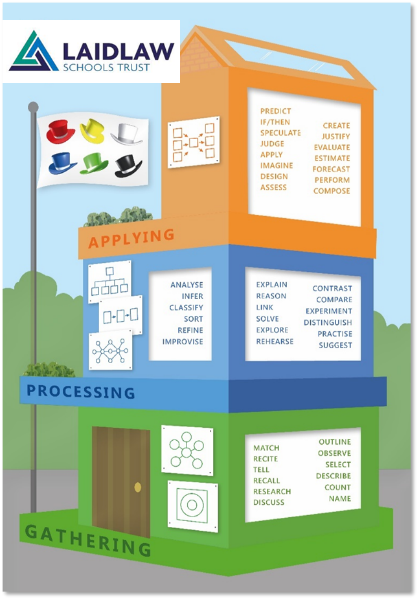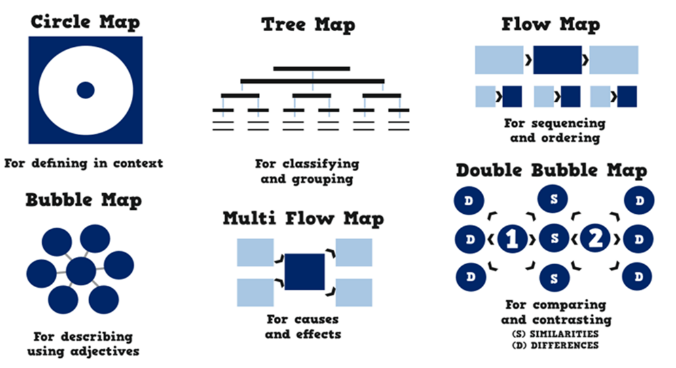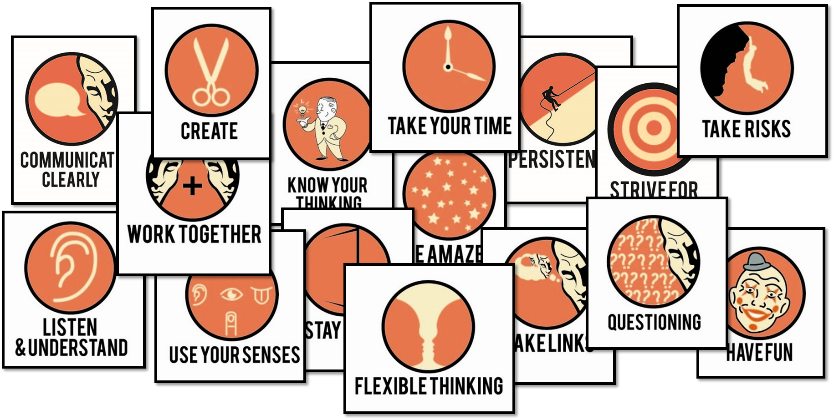Inevitable Progress
Introduction
At Academy 360, we have planned an ambitious knowledge rich curriculum and are committed to the continuous development of high quality teaching and learning to ensure that all of our students are able to achieve their full potential. We ensure that teaching and learning is always central to the way in which we operate as a school and this is seen in a wide variety of ways including the clear focus on the development of teacher practice in the school’s own CPD programme and the profile of teaching and learning across the school.
As a member of Laidlaw Schools Trust, we share our Trust values and the underpinning commitment that all students can and must make progress in all aspects of their learning. We ensure that we have defined what is to be known in every subject and share this with students in ways they can understand. We call this idea ‘Inevitable Progress at 360 ( IP@360) and have shared aims that:
- All students will achieve their full academic potential as seen in the qualifications that they achieve during the course of their time at A360;
-
All students will develop the knowledge and skills that they need to be successful learners at A360 and then beyond as lifelong learners;
-
All teachers are supported to be lifelong learners, ensuring a continuing focus on their own professional development as a teacher;
-
We will all play our part in transforming lives through extraordinary education.
Each year we focus on developing our expertise further in the light of educational research and the needs of our own students. Our curriculum intent documentation should be live material, evolving in light of our reflections, with clear definition of what students will know and be able to do at each mini end-point. To ensure IP@360 is a success, we ask the following of leaders and teaching staff:
-
To be curious and draw upon recent research from cognitive science, including Rosenshine’s Principles of Instruction, to refresh our approach to curriculum planning teaching, learning and assessment.
-
To be brave as we continuously evaluate our curriculum and implementation approaches to determine impact and efficacy and stop practice that does not work.
-
To be determined as we embed positive classroom practice and accurate literacy and numeracy across the academy.
-
To work quickly to ensure that high quality, reliable assessment data (both formative and summative) lies at the heart of planning and adaptive teaching.
-
To be ambitious as we work collaboratively to increase levels of student motivation, participation and independence and their academic attainment.
-
To extend our professional learning and guidance systems for staff at all stages of their careers so that all students experience consistently high standards of teaching and experience extraordinary education.
-
To refine our approaches to quality assurance so that leaders have a consistent approach to the review of teaching and learning and have the confidence and ability to give appropriate, actionable guidance to ensure that our teams can be consistently ‘Good’ in all that they do.
The Three Storey Intellect
The Three Storey Intellect is the most important ‘tool’ in the ‘Inevitable Progress’ toolbox. In simple terms, it provides us with a common language for learning that can be used by students and staff to allow meaningful discussions about the learning that is taking place. is also used by teachers to support them in constructing effective learning sequences in every lesson, ensuring maximum progress is achieved.
The Three Storey Intellect is represented by a building with three storeys, each one of which relates to one of the three basic stages of the learning process.

1st Storey - Gathering. We think carefully to ensure absolute clarity in the vital content, knowledge and skills that we need to ‘gather’ with our students. We ensure that firm foundations for future learning are established, but also ‘gathered’ efficiently, to maximise learning time for other elements of the learning process.
2nd Storey - Processing. Students are given opportunities to explore the content that has been gathered or to refine skills that have been introduced to them. Teachers use their expertise to identify the precise level of ‘scaffolding’ that is appropriate to enable students to secure their understanding at this stage of the learning process.
3rd Storey - Applying. Regular opportunities are provided for students to ‘apply’ their learning in a range of familiar and unfamiliar contexts. This enables students to retain their learning in the longer term. Crucially, students are given opportunities to make mistakes but are then encouraged to reflect upon these and learn from them.
The Three Storey Intellect is a framework that supports the development of effective learning. The three storeys can be thought of as the building blocks of the learning process and the expertise of the teacher determines the best way to assemble these different blocks in each and every lesson.
Questioning is a very important element of ‘Inevitable Progress’. We think carefully about the way in which the nature of questions will develop as we move through the different storeys, and also encourage students to be intellectually curious and pose questions of their own.
Thinking Hats
Edward de Bono’s six Thinking Hats are used across all academic years and curriculum areas. Students become experts in employing this learning strategy and it provides them with a structure that supports them to think deeply and with independence.
When wearing each of the six metaphorical ‘hats’, students are required to think in a particular way and these are summarised below:
- Blue Hat – Planning and organising ideas
- Red Hat – Emotions and how you feel
- White Hat – Facts and the information that you know
- Yellow Hat – Benefits relating to the issue being considered
- Black Hat – Problems relating to the issue being considered
- Green Hat – New ideas and creative thinking

Using the hats, students are supported to think in different ways, exploring an issue fully and not defaulting to thinking about it from just one angle.
Thinking Maps
The American academic David Hyerle developed a number of Thinking Maps, each of which links to a particular type of thought process. These ‘maps’ serve as ‘visual organisers’ and help students to organise their thinking during the ‘gathering’ and ‘processing’ stages of the learning process, enabling them to more effectively ‘apply’.
As with the Thinking Hats, the Thinking Maps are a strategy that is used across the school to ensure that our students become experts in how to employ them.

Circle Map – Defining in Context. Putting down on the page the information that you already know (or think you know) about the subject.
Bubble Map – Describing with Adjectives. Identifying the adjectives that best describe the different aspects of the subject you are thinking about.
Double Bubble Map – Comparing and Contrasting. Considering the similarities and differences between, for example, two people, places or events that you wish to compare.
Flow Map – Sequencing and Ordering. Organising a series of ideas into the right or best sequence and understanding how they link together.
Multi-Flow Map – Causes and Effects. Identifying the different factors that might cause something to happen and the range of possible effects of this.
Tree Map – Classifying and Grouping. Organising a range of people, places or events, for example, into different groups depending on the way that they relate to one another.
Habits of Mind
If we are to be successful in our aim of developing students who are able to become excellent lifelong learners, we need to help them to instil the personal qualities that will result in them achieving their full potential.
American educationalist Art Costa identified sixteen Habits of Mind that the most successful people are able to use when necessary. It is this concept of Habits of Mind that we are using to help us to develop the ‘learning habits’ that our students need to achieve success.

In all aspects of school life, we look to make students and staff aware of these sixteen Habits of Mind that can help us all to be successful. This helps people to recognise those habits that it would be beneficial for them to develop. Crucially, we adapt our practice and plan for how best to ensure these vital learning habits can best be supported and developed.
The Inevitable Progress Sequence
Outstanding progress is about more than individual lessons. Over time, lessons need to be expertly linked together in a way that helps students to secure and deepen their learning. We think of our Inevitable Progress approach as a sequence, key aspects of which are outlined below.
- We carefully identify ‘vital content’. By ensuring learning sequences are focused upon exactly what students need to know and do, we are able to ensure depth to learning. We also ensure that there are regular opportunities to revisit and deepen understanding of elements of the curriculum already taught.
- We think carefully about the use of ‘scaffolds’ to support learning. A key element of this approach involves ensuring that there is consistency in these scaffolds across teaching staff, academic years and where appropriate curriculum areas. Using the same scaffolds repeatedly helps students to internalise and apply them with sophistication.
- We want our students to think carefully about their own learning and take ownership of this. That’s why we focus on approaches that support high-quality self and peer assessment.
- A simple three-stage approach to revision is used across the school:
- WHAT – we establish precisely what students need to learn/understand
- HOW – we guide students to revise effectively by providing concrete strategies that aid revision
- CHECK – we support students to recognise the impact of their revision, enabling them to understand their next steps.
Literacy – The Reciprocal Reading Sequence
We recognise that having excellent literacy skills is crucial to the success of our students both at school and for the remainder of their lives. We use the Reciprocal Reading sequence to provide students with a strategy that enables them to independently extract meaning from challenging texts.
All teachers understand the Reciprocal Reading sequence and look to use it whenever appropriate. In addition, dedicated Reciprocal Reading lessons take place regularly across a number of subject areas, so that all students are being given regular opportunities to develop this skill.
The stages of the Reciprocal Reading sequence are:
- Recall (Gathering): students are asked to recall what they already know (or think they know) about the topic of the text to be read
- Predict (Applying): students are encouraged to predict how they feel the text will develop after reading the opening line - activating their thinking from the outset
- Read (Gathering): students take the time to read a short section of the text
- Clarify (Processing): time is taken to clarify the precise meaning of any unfamiliar language, or any language that students may feel is familiar, but about which there may be misconceptions
- Questioning (Processing): students are encouraged to pose their own questions based on the section of text read
- Summarise (Processing): students are asked to provide a summary of the key points of the section of text that has been read
In many schools, reading is seen as a simple ‘gathering’ activity. Through the Reciprocal Reading sequence, reading becomes a ‘processing’ and ‘applying’ activity, increasing the depth of learning that is achieved.
Making Links Across the Curriculum
In line with our ethos of creating learners who can think deeply and with independence, we want to support our students to make connections between their learning across academic years and different curriculum areas. We believe that supporting students to think about these connections helps them to secure their learning in the long term.
In order to achieve our aim, we have developed eight cross-curricular themes and an additional eight cross-curricular skills. Whenever these themes or skills are addressed in a lesson, teachers draw attention to this using the appropriate icon. A summary of the themes and skills is provided below:

As well as supporting students to think about their learning, our process for making links also provides students with additional opportunities to develop their oracy skills in lessons.
Debating Ethos
There are many elements of ‘Inevitable Progress’ that support students to develop excellent oracy skills and we want our students to have the confidence and skills to present and discuss issues with people from all backgrounds. That’s why students have regular opportunities to engage with and debate a wide range of topics.
Whilst all teachers and subject areas are constantly looking for opportunities to support our debating ethos, specific debating lessons are part of the curriculum in a number of subject areas including English, Science, Geography and History. Through this approach, we can be confident that all students have regular opportunities to develop these vital skills.
Digital Technology
Embracing the full potential of digital technology is an important element of our ‘Inevitable Progress’ approach. We recognise that digital technology provides teachers and students with a range of tools that can ensure outstanding progress and that we must equip our young people with the skills to thrive in a digital world.
In order to ensure that we are using digital technology in a highly effective way, we consider how digital technology can support each stage of the Three Storey Intellect approach:
- Gathering: we consider how technology can support students to gather information efficiently and effectively, increasing levels of engagement through the variety of ways in which these gathering activities can be carried out
- Processing: we consider how technology can enable more effective processing to take place, most notably through the way in which technology can be used to personalise learning
- Applying: we consider how technology can provide students with opportunities to both apply their existing understanding and reflect deeply, to allow further progress in the future
Linked to this, we have identified six ways in which we can employ digital technology within our Inevitable Progress approach to teaching and learning:
- Optimising learning time – allowing approaches that will ensure that learning time is well spent
- Allowing greater personalisation of learning – students are able to access a greater range of materials
- Increasing student engagement – using technology to teach the curriculum in innovative ways that capture the interest of students
- Facilitating low stakes assessment and self-assessment – access to technology will allow students to carry out these approaches in a wide variety of ways
- Developing independent learners – students are able to take greater ownership of their own learning, particularly revision
- Developing learning beyond the classroom – technology has the potential to blur the boundary between school and home learning
